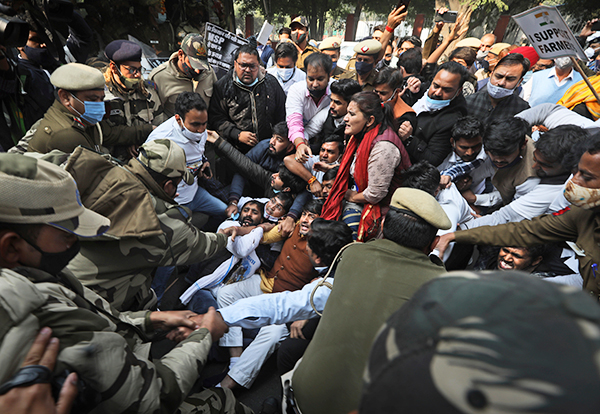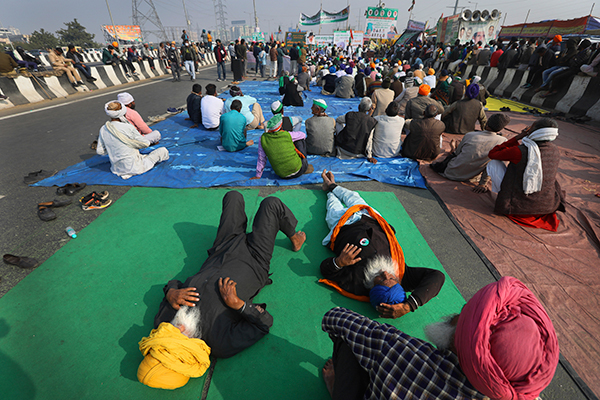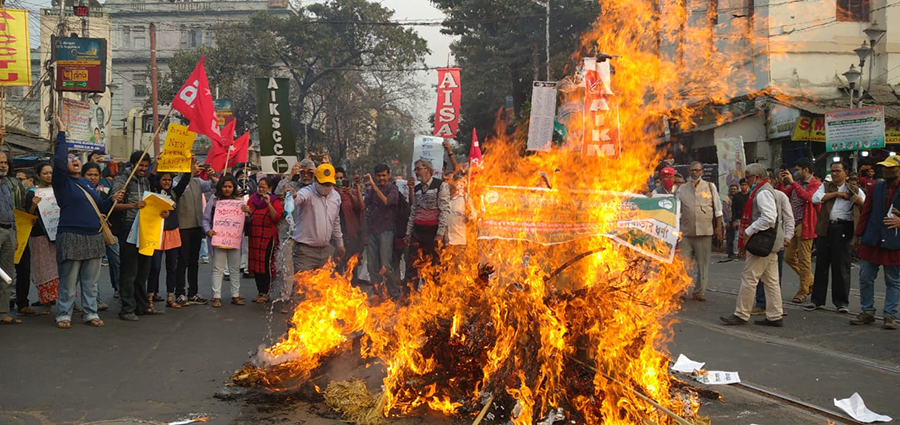In September 2020, three new laws affecting agriculture were pushed through Parliament in India, at the direction of the fascist regime headed by Modi and his Hindu-Nationalist Bharatiya Janata Party (BJP). This has set off a huge wave of protests.
Until now, certain government regulations affecting how large numbers of farmers sell their agricultural goods, the prices they get, and how produce is stored provided a section of farmers with a very limited measure of security. But now, in the name of reform, the Modi government is attempting to do away with even these limited protections.
The effect will be to subject farmers in India to an even greater onslaught by and competition from global capitalist agribusiness, with its immense financial resources, control of seeds and fertilizers, and ability to dominate markets. India's struggling farmers will be even more at the mercy of corporations and the anarchy of the global market. Increasing numbers of farmers will lose their land and face more desperate conditions.
These so-called “reforms” will have especially devastating effects at this time—because many people have fled the cities on account of the COVID pandemic, returning to their traditional rural areas and working the land for survival.
The new laws strengthen the hand of large capitalists and corporations who want to invest and speculate in land. They will now have the ability to buy crops directly from farmers—where before, crops were sold through government-backed marketing agencies. This will put more pressure on farmers to sell at lower prices.
What is happening to agriculture in India is an expression of, and a product of, larger changes and transformations taking place in the world imperialist economy. This is the economy that dominates the lives of the nearly eight billion on the planet. Global imperialist agribusiness utilizes new biotechnologies to develop and patent seeds, pesticides, and fertilizers to increase efficiency and output and to increase monopolistic control over markets for these “inputs.” Farmers worldwide become more dependent. At the same time, capitalist and imperialist agribusiness increasingly dominates global markets with the power of pricing and loans, and establishes networks of contract farmers around the world. Small-scale, peasant-based subsistence agriculture—food produced for local household consumption—is being wiped out. Third World economies are “restructured” and “reformed” to meet the needs of imperialism: producing “nontraditional” fruit and vegetables for export, “luxury” foods for high-income consumption. Large-scale industrialized farming—from Brazilian beef to Southeast Asian “shrimp farming”—takes hold. And imperialist agribusiness is engaged in vast profit-driven, land-grabbing investments in the oppressed countries.
These are seismic changes that have contributed to the ruin of small-scale peasant agriculture and to the huge migrations of humanity from the countrysides of the Third World to what have become mega-cities and mega-slums of the Third World. And these forces are at work in influencing the kinds of “reforms” pushed by the Modi regime.
The Struggle of Indian Farmers Becomes a Rallying Cry
The new laws took many by surprise. But they are totally in line with the fascist tactics of rule by diktat: arbitrary and unpopular measures imposed on people without even the facade of legislative discussion and consent.
Immediately after these bills were passed last year by the BJP regime (with no input or even debate among the farmers and their organizations), protests erupted, first in the state of Punjab. Since September, these protests have continued and grown tremendously in size and impact across various states on India. On November 26, 2020, a general strike was held throughout India—mobilizing some 250 million people around the call for an end to the anti-farmer laws and other anti-labor laws.
In late November, protesting farmers, largely of Sikh background and from the regions of Punjab and Haryana, marched on New Delhi, the capital of India. There they were met by vicious government repression. The nonviolent marchers were stopped by concrete barricades, tear gas, and water cannons. In response, they blocked almost all major roads leading into the city with their tractors and trucks. Their numbers swelled by some estimates to the hundreds of thousands. Many planned to stay until the Modi government relents, having enough supplies for weeks or even months. Networks of support, including open kitchens, were set up to aid the protesting farmers who were now occupying parts of the city. Support has also been offered by prominent musicians and artists, particularly those from Punjab, demonstrating the ability of the protests to garner support from many sections of the population.
Some 45 percent of India's labor force is employed in agriculture—most working as laborers but there are large numbers of farmers as well. The vast majority of India’s farmers have very small land holdings and are kept in desperately poor conditions. In most cases, they own less than two and a half acres of land (by contrast, the average farmer in the U.S. owns 444 acres!), and must borrow money from parasitic banks and landlords to cover their expenses at rates far above what they are able to realistically pay back. This indebtedness, combined with the toll taken by drought and climate change on the lives and livelihoods of farmers, has led to hundreds of thousands of Indian farmers committing suicide since the 1990s—in many cases by ingesting pesticides. According to one count, more than 10,200 people dependent on farming for their livelihoods, the vast majority who own land themselves, committed suicide in 2019. This is a tremendous human tragedy caused by the profit-based system that rules...and is wholly unnecessary.
The Indian ruling class has no viable, humane response. Its answer—as concentrated in the policies which has spurred this justifiably intense and angry rejection from the masses of people—is to drive those already in poverty into further immiseration and suffering, while the capitalists intensify their exploitation of labor and the earth.
The basis exists, with a different mode of production, one based in collective ownership and cooperative methods, to resolve these crises in the interests of the broad masses of people. The masses of people in India, and all over the world, need revolution—nothing less. A revolution to sweep away the system that has brought them to this point of mass suffering and suicide, and bring into being a new society and government actually acting in the interests of the people. This would open up the possibility for an economic system not based on anarchic competition, but on meeting human need.
Under this kind of system, a socialist system aiming for communism, advances in technology and increased efficiency resulting from this as well as the common ownership of land and other means of production, would be marshalled for the common good of society as a whole. Instead of a desperate drive to sell at a profit, under the threat of debt and misery, agricultural workers would be able (as would other sections of society) to work together with a collective ethos and inspiration to fulfill the great needs of the masses. And if and when such productive work cannot be found, a socialist state, no longer chained to the profit motive, can shift and create new jobs and opportunities in accordance with where the greatest need exists.
A genuine revolution would make food security and meeting the nutritional needs of the population a fundamental priority of society. It would develop systems of agricultural and food production that are environmentally sustainable.
Absent all this—the revolutionary transformation of society—nothing fundamental will change, in this sphere or any other, in a positive direction.

Immediately after bills were passed, protests erupted, and were met by vicious government repression. (Photo: AP)
Listen to the podcast
Emancipate Humanity with Bob Avakian
presented by The RNL—Revolution, Nothing Less!—Show
See podcasts from the Emancipate Humanity With Bob Avakian series...
Go further into understanding the world…to make revolution and emancipate humanity >>

